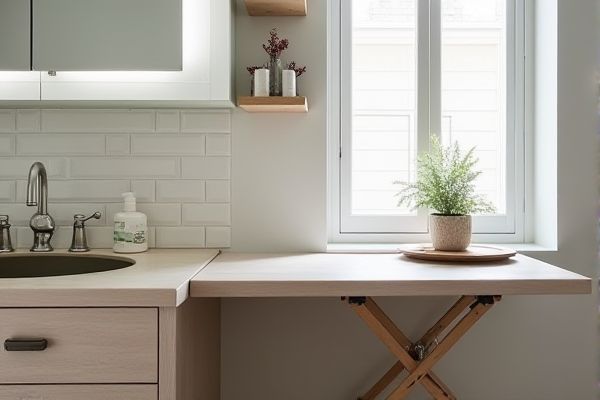
A countertop folding station offers a compact workspace that can be easily integrated into existing kitchen or laundry areas, maximizing surface area without permanent installation. To discover which option best suits your space and lifestyle, explore the rest of this article for a detailed comparison of countertop folding stations and wall-mounted folding tables.
Table of Comparison
| Feature | Countertop Folding Station | Wall-Mounted Folding Table |
|---|---|---|
| Installation | Requires countertop space; minimal setup | Mounted on wall; requires drilling and anchors |
| Space Efficiency | Occupies countertop; limited space saving | Folds flat against wall; maximizes floor space |
| Portability | Fixed on countertop; less portable | Fixed to wall; not portable |
| Weight Capacity | Moderate; depends on countertop stability | High; supported by strong wall anchors |
| Usability | Easy to use; always available | Requires unfolding; saves space when not in use |
| Cost | Generally lower-cost; no installation needed | Higher cost; includes installation expenses |
| Ideal Use | Small kitchens or limited wall space | Small rooms; maximizing available floor area |
Introduction to Folding Stations and Tables
Folding stations and wall-mounted folding tables are practical solutions designed to save space and enhance functionality in various environments such as laundry rooms, workshops, or kitchens. A countertop folding station offers a stable, elevated surface integrated into existing cabinetry, providing convenient, accessible workspace without occupying extra floor area. Wall-mounted folding tables, on the other hand, can be folded flat against the wall when not in use, making them ideal for maximizing room space in compact areas.
Key Differences Between Countertop and Wall-Mounted Options
Countertop folding stations offer portability and easy installation, making them ideal for flexible workspaces, while wall-mounted folding tables provide a more permanent, space-saving solution anchored to your wall. Countertop options typically feature lightweight materials and compact designs, whereas wall-mounted tables are sturdier and support heavier loads due to secure mounting hardware. Choosing between these depends on your spatial constraints and usage frequency, with countertop stations suiting temporary setups and wall-mounted tables fitting long-term, dedicated areas.
Space-Saving Benefits: Countertop vs Wall-Mounted
Countertop folding stations maximize space efficiency by providing a compact, portable surface that can be easily tucked away when not in use, ideal for small kitchens or laundry areas. Wall-mounted folding tables offer a sturdy, fixed workspace that folds flat against the wall, freeing up floor space without sacrificing usability. Your choice depends on whether you prioritize portability and versatility with a countertop option or a more permanent, space-saving solution through wall installation.
Installation Requirements and Flexibility
Countertop folding stations require minimal installation, often needing only secure mounting beneath a countertop for quick setup and easy access. Wall-mounted folding tables involve fixed installation with anchors drilled into studs, offering robust support but limiting relocation options. Your choice hinges on whether you prioritize flexible positioning or a more permanent, space-saving solution.
Durability and Material Comparison
Countertop folding stations typically feature durable laminate or solid wood surfaces combined with steel or aluminum frames, offering strong resistance to wear and tear in heavy-use environments. Wall-mounted folding tables often utilize robust plywood or metal tops paired with heavy-duty hinges and brackets, ensuring stability and longevity while maximizing space efficiency. Both options provide high durability, but countertop stations may offer enhanced material thickness and easier replacement, whereas wall-mounted tables excel in saving floor space without compromising structural integrity.
Ergonomics and User Comfort
Countertop folding stations offer a stable, shoulder-height surface that minimizes bending and strain, enhancing ergonomics during folding tasks. Wall-mounted folding tables can be adjusted to your preferred height, promoting better posture and reducing back discomfort by allowing customized positioning. Both options improve user comfort, but your choice depends on available space and desired flexibility.
Aesthetic Appeal and Design Choices
Countertop folding stations offer a sleek, integrated look that maintains kitchen or workspace continuity, often featuring materials like granite or quartz to match existing surfaces. Wall-mounted folding tables provide a minimalist aesthetic with clean lines and the option to fold away entirely, maximizing space without sacrificing style. Both designs support modern, functional interiors, but countertop stations excel in seamless design integration while wall-mounted tables prioritize space-saving versatility.
Maintenance and Cleaning Considerations
Countertop folding stations offer easy access to all surfaces, making routine cleaning straightforward and minimizing buildup of dirt or grime. Wall-mounted folding tables often require extra attention to hinges and mounting points, which can accumulate dust and may need periodic lubrication or tightening to maintain stability. Your maintenance routine should prioritize inspecting hardware on wall-mounted options, while countertop stations generally demand less effort for upkeep and faster cleaning turnaround.
Cost Analysis: Countertop vs Wall-Mounted Solutions
Countertop folding stations typically offer lower installation costs since they require minimal structural modifications compared to wall-mounted folding tables, which often need reinforced wall support and professional mounting. Maintenance expenses tend to be similar for both options, but the initial investment in wall-mounted tables can be higher due to hardware and labor. Your decision should weigh upfront installation costs against space-saving benefits and long-term durability.
Best Use Cases and Recommendations
Countertop folding stations excel in small kitchens or laundry rooms where space efficiency and quick access are essential, providing a sturdy surface that folds down when not in use. Wall-mounted folding tables are ideal for multipurpose rooms or areas requiring occasional workspace, offering flexibility with easy installation at various heights to suit specific tasks. For best results, choose countertop stations in high-traffic areas needing durability, while wall-mounted tables are recommended for temporary or adjustable use scenarios.
 homyna.com
homyna.com